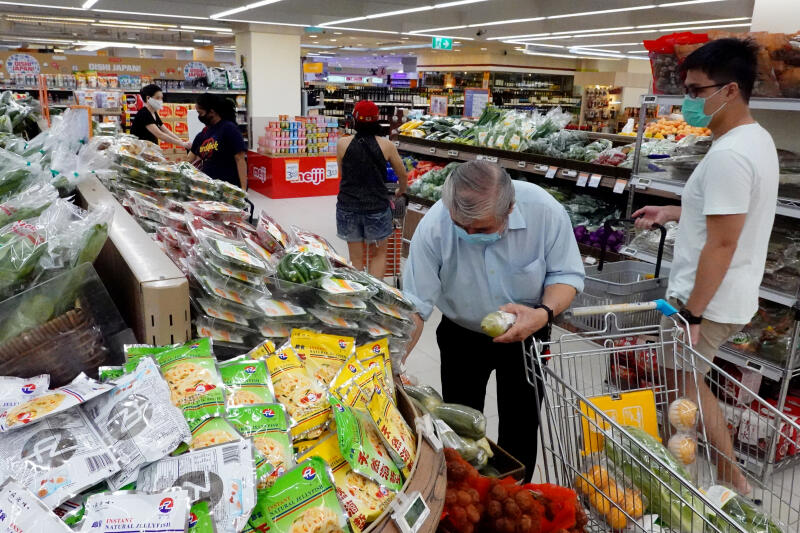Singapore's core and overall inflation remain negative in July
Core inflation at decade low as core consumer prices dip for sixth month in a row
Sign up now: Get ST's newsletters delivered to your inbox

Food inflation edged down slightly, at 2.2 per cent in July, compared with 2.3 per cent the month before.
ST PHOTO: LIM YAOHUI
Follow topic:
Core inflation fell deeper into negative territory last month due to a steeper decline in the cost of electricity and gas, and lower inflation for non-cooked food.
Core inflation, which excludes accommodation and private road transport costs, came in at minus 0.4 per cent in July, down from minus 0.2 per cent in June. This is the lowest since core inflation hit minus 0.5 per cent in January 2010.
It was the sixth straight month of core consumer prices falling below the same period a year ago.
A smaller decline in the cost of private transport saw overall inflation ease slightly last month to minus 0.4 per cent, from minus 0.5 per cent in June, according to data released by the Monetary Authority of Singapore (MAS) and Ministry of Trade and Industry (MTI) yesterday.
Private transport costs fell at a slower pace of 2.1 per cent in July, compared with the 4.4 per cent drop in June, as car prices rose.
The cost of retail and other goods also recorded a smaller decline at minus 1.6 per cent last month, compared with minus 1.8 per cent in June, as the prices of telecommunication equipment rose and the fall in household durables and personal care product prices moderated.
The cost of electricity and gas saw a much sharper fall in July at negative 15.2 per cent, compared with minus 3.9 per cent in June, mainly due to a steeper decline in electricity prices as the electricity tariff was revised downwards.
While inflation for non-cooked food fell in July, food services inflation remained broadly unchanged.
Food inflation edged down slightly at 2.2 per cent in July, compared with 2.3 per cent in June.
Accommodation inflation in July fell to 0.4 per cent, compared with 0.5 per cent in June, as housing rents increased at a slower pace.
Services cost also eased last month, at negative 0.8 per cent compared with minus 1 per cent the month before, as holiday expenses and airfares fell at a slower pace while the cost of telecommunication services rose more rapidly.
MAS and MTI noted that in the quarters ahead, external sources of inflation are likely to remain benign amid weak global demand conditions. "Oil prices are expected to stay low for an extended period, while international food commodity prices have also declined. However, supply chain disruptions associated with international measures to contain the Covid-19 outbreak could continue to keep imported food prices elevated," they said.
Domestically, subdued economic sentiment and weak labour market conditions will dampen consumer demand, capping price rises for discretionary goods and services, they added. "Cost pressures are likely to remain low as some degree of spare capacity in the economy emerges."
MAS and MTI forecast core inflation and overall inflation to average between minus 1 per cent and 0 per cent this year. Meanwhile, analysts expect inflation for the full year to be in the negative territory.
United Overseas Bank economist Barnabas Gan said the rate of deflation could taper if Singapore's tourism industry picks up amid the easing of inbound travel restrictions. However, deflation pressures are expected to persist for the rest of this year, he added.
"The mix of falling domestic and tourism-led demand, coupled with low oil prices for the rest of 2020, are formidable headwinds against consumer prices. Meanwhile, the weak labour market that is expected to continue should cap increases for discretionary goods and services demand, " he wrote in a note.

